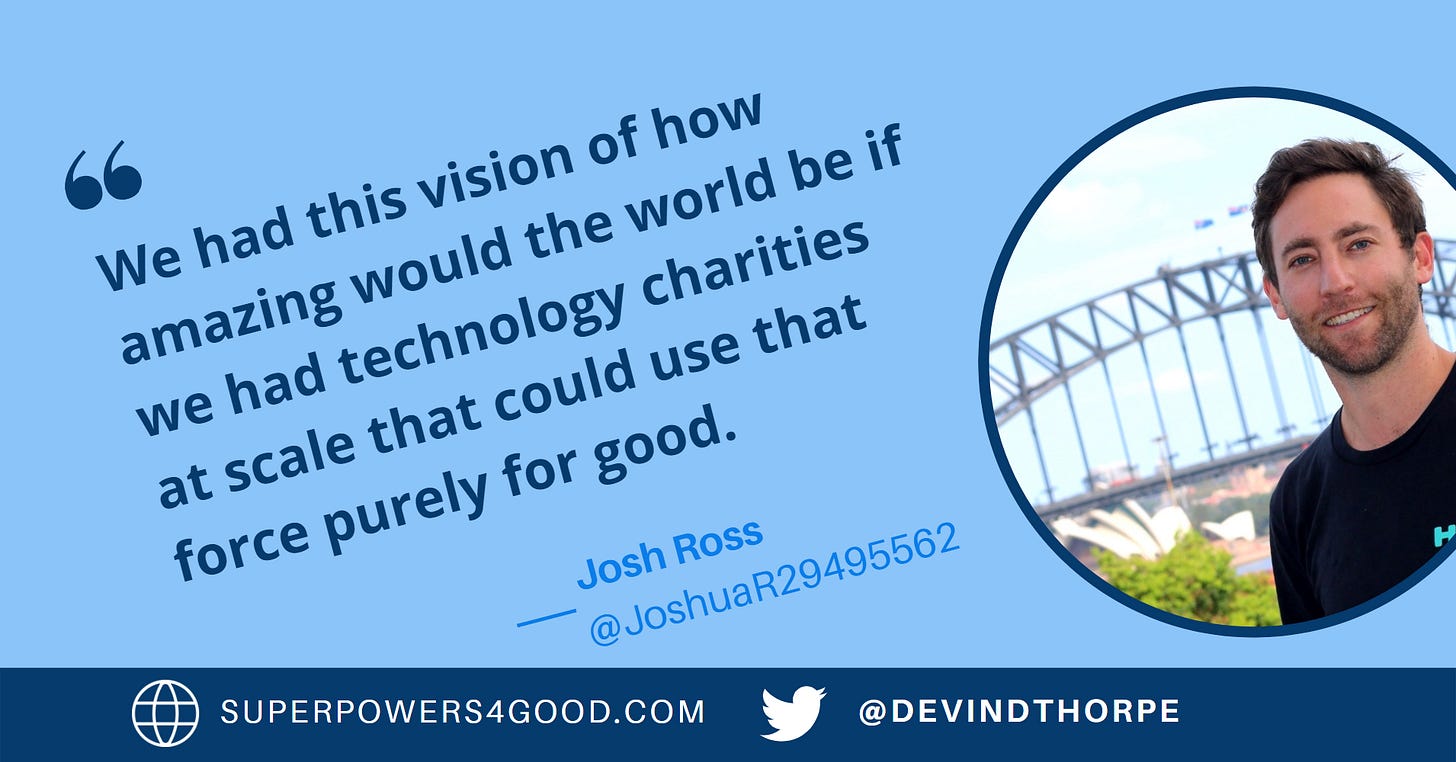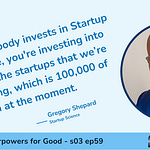Devin: What do you see as your superpower?
Josh: My superpower is my friendship with Adam. So Adam's been my best mate pretty much since university days, and I would never have been able to do this without him.
Humanitix co-founder and co-CEO Josh Ross says, “Humanitix is a ticketing platform for events. Think of it like an ethical alternative to an Eventbrite. We exist to solve social problems.”
After recording this interview last month, we swapped out our ticketing host for SuperCrowd22 to use Humanitix. When you finish reading, watching or listening, I hope you’ll agree we made a good call.
The Story of Humanitix
Josh and his co-CEO Adam McCurdie built Humanitix from the ground up as a nonprofit. “We had this vision of how amazing would the world be if we had technology charities at scale that could use that force purely for good.”
The nonprofit tech company is now the go-to ticketing platform in Australia and New Zealand. As a nonprofit, mission gets prioritized above profits.
The profits the nonprofit tech company generates are committed to causes, Josh says:
All the profits we make from our booking fees go into different education programs. Globally, we focus on young girls literacy programs. In America, we partner with Code.org, and we fund computer science and STEM programs for disadvantaged kids from low-income backgrounds.
In addition to that use of funds, Josh sees Humanitix playing a pivotal role in making events more accessible. He notes that many people with significant disabilities have simply given up on attending events.
Josh and Adam don’t own shares in Humanitix. No one does. As a nonprofit designed to serve the community, the entity in effect belongs to the community. While the founders could merge the business into another, they couldn’t benefit directly from such a transaction. They can make a living from Humanitix, but it will never make them wealthy.
Josh explains that this is possible because before launching Humanitix, they spent six years in the corporate world “where we were doing well.” He adds that they come from “decent families” that have been supportive.
“So, we don't need to make tens of millions or hundreds of millions of dollars personally,” Josh says. “So, as long as we can earn an honest living, this is a way more exciting thing to do with our time.”
Josh adds that having pledged the profits to education programs, having traditional investors would create tension between them and the mission.
To finance the launch of a business that would never distribute profits to shareholders seems daunting. “We found philanthropists that understand the power of what we're doing,” Josh says, noting that they appreciate the fact that in the long run, the nonprofit would become self-funding.
“We've become a self-funding charity in Australia, New Zealand, so we didn't need [philanthropic] investors for long,” he says.
The structure also makes the business and mission transparent. Josh explains:
We can't give a tokenistic amount to our projects and then sell this to a big tech company in five years’ time. Because even if there was a sale, the money is not ours. And there's a constitution and a registered charity there where we'd go to prison if we started pocketing that money. It's got to go towards benevolent purposes. So, it gives comfort to us, to all the people that have helped us get here, but also our clients who believe in our mission, that we're not going to sell out.
Given that the founders want to change the world rather than create wealth, the nonprofit structure has aligned the interests of everyone else involved.
Josh’s lack of greed does not translate into a lack of vision. He sees big things ahead.
If we can scale to a similar size as Eventbrite in America, which we've achieved, we think in Australia, New Zealand, we should be spitting out roughly $20 to $30 million a year to our education programs, and we’ll be a lot more advanced in improving accessibility at live events. We also save nonprofits money when they ticket through us because we let them use our platform at a sustainable price, which should keep coming down over time.
It is exciting to imagine.
Making Events Accessible
Accessibility is a big challenge for event organizers as well as for those with disabilities. “People don't realize a lot of events break even at best,” Josh says. The implication is that they don’t have big budgets for accomodating disabled participants.
Josh adds, “Event organizers are under pressure. They don't necessarily have the time or knowledge to address this problem.”
For example, a big challenge is facilitating the participation of people who are blind or visually impaired.
“If you're blind, you probably use a screen reader device on your iPhone or whatever you use, and that reads to you what's on the website and helps you navigate it,” Josh says. “But it needs the website to play ball. It needs that behind images there are text descriptions of what that image is.”
That’s just the beginning. Now imagine attending a conference at a major convention center in a large city. The facility may occupy a square mile in the city center and have a dozen different entrances.
Josh says, “Now if the event organizers just told you the International Convention Center, great. You get in your Uber, and you tell them International Convention Center, and it's going to be a nightmare trying to find.”
I know I’ve personally struggled to find a venue within a major event center without the challenge of a disability. I can only imagine how frustrating it would be with those added difficulties.
“We've done a range of design workshops with people with varying disabilities, not just visual impairments, to understand what information you really need,” Josh says.
“Knowing that a venue is wheelchair accessible is not necessarily enough,” Josh says. “If you speak to guest speakers who are in wheelchairs, most of them have experiences of ‘Yeah, I was told the venue was wheelchair accessible, but the stage wasn't.’”
Josh shares the report of one such speaker, “So I'm sitting near the stage at a gala dinner. I get called up to give the keynote. I roll up to the front of the room, but I can't get on the stage. It's incredibly embarrassing. I'm in front of 500 people.”
To help event organizers both make their events more accessible and help them make their participants who need accommodation aware of them, Humanitix offers eight modules that guide and assess accessibility. The responses are available to interested participants, who can then decide if they are able to attend comfortably.
Humanitix also provides online training resources for event organizers so they can make events accessible.
“We've only been around for six years. So, you know, we have not solved event accessibility. I'd never want to say that,” Josh says. “But we believe we're the market leaders in it. Even the [Australian] Government's Royal Commission on Disability Services, [when] they run events, they use us.”
In all this success and impact, Josh sees his superpower playing a critical role. His superpower is friendship.
How to Develop Friendship As a Superpower
After asking this superpower question close to 500 times, I’m rarely surprised anymore. Josh’s answer about friendship surprised me. He acknowledged that it sounds “corny,” but the more he talked, the more I believed in its power.
In fairness, it takes two people committed to a friendship to make it work. Josh says that starting Humanitix with Adam, his friend, was premised on a critical understanding. Adam might have joined us for this interview but was on his honeymoon with his new bride when we recorded it.
“We were quite intentional about this when starting Humanitix because we actually said to each other, if this starts to eat away at our friendship, we'll both quit and stop it because our friendship matters more to us,” Josh says. That is a powerful commitment to the friendship.
Over the years, there have been challenges that the pair of friends have overcome. “We shared a bedroom for three months when we were launching it,” Josh says.
There is power in friendship. “When you've got someone you implicitly trust and love that has your back, it allows you to be a better version of yourself,” he says.
The friendship also provides courage. “Mentally, I think, would have been too lonely to step out of a comfortable job, to take a risk like this,” Josh says.
The simple observation that two heads are better than one also plays a part in their success. “His skill set is so complementary to mine,” he says of Adam.
To make the friendship/partnership work, Josh and Adam established some rules. Josh reviewed two primary examples.
No Resentment:
The first thing we identified as something that could become a problem is resentment. Nothing in life is ever fair.
He had a technology background. In the first few years, you’ve got two major problems. One is you've got to build a platform. The other is you've got to fund it. Now, at times, funding is more of the pressure. At other times the product is more the pressure. So, at times, he’s working until 2:00 in the morning.
I had a finance background. At times, I'm working till 2:00 in the morning. But imagine you're sitting there not getting paid, you're not building equity in anything and you're working your ass off to try and make this work. And your co-founder, who has a different skill set, who isn't at that point—is still working hard but is having some quality of life.
It would be pretty easy to be sitting there [feeling] resentment. '“I might not raise this, but [I’m feeling] resentment.” And that seed of resentment is the future downfall of your friendship.
Raise Things Early.
The other is to raise things early. So, you know, we all get on each other's nerves. It might be that you're not cleaning the coffee machine now. It sounds like a petty, small thing, but if you sit on that, then 99 percent of the time, in my experience, you blow up at them about something else after a while because it eats away at you.
We've become more radically honest. And the rule is, if you raise something, Devin, from three months ago that I did that pissed you off, it's your problem because we're three months later now. If you raise it at the time, great. I have to thank you for raising it because I realize it's awkward and tough to raise things.
Employing the rules works, Josh says. “We haven't had any serious fights. So, there are a couple of rules there that are really, really important.”
By following the example of Josh and Adam and by employing their rules, you could make friendship a superpower that would allow you to do more good.
SuperCrowd22
Now that we’re using Humanitix for SuperCrowd22, I want to reiterate the invitation to attend. Social entrepreneurs are working effectively to solve social problems in exciting ways, like:
Fighting climate change with batteries for music festivals, replacing polluting generators
Improving global health with solar-powered oxygen concentrators ruggedized for use in remote villages
Eradicating poverty by employing women in Afghanistan to make snacks for sale in the U.S.
The examples are endless. Learning to invest wisely to maximize impact and return can allow you to change the world while you invest for your future.
Free Superpowers for Good readers can attend for half price, saving almost $100! Register here. Paying subscribers can register absolutely free! Subscribe today (after subscribing, you’ll receive an email with a link for free SuperCrowd22 registration).















